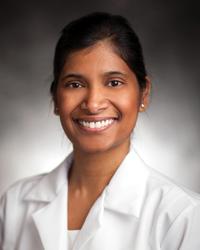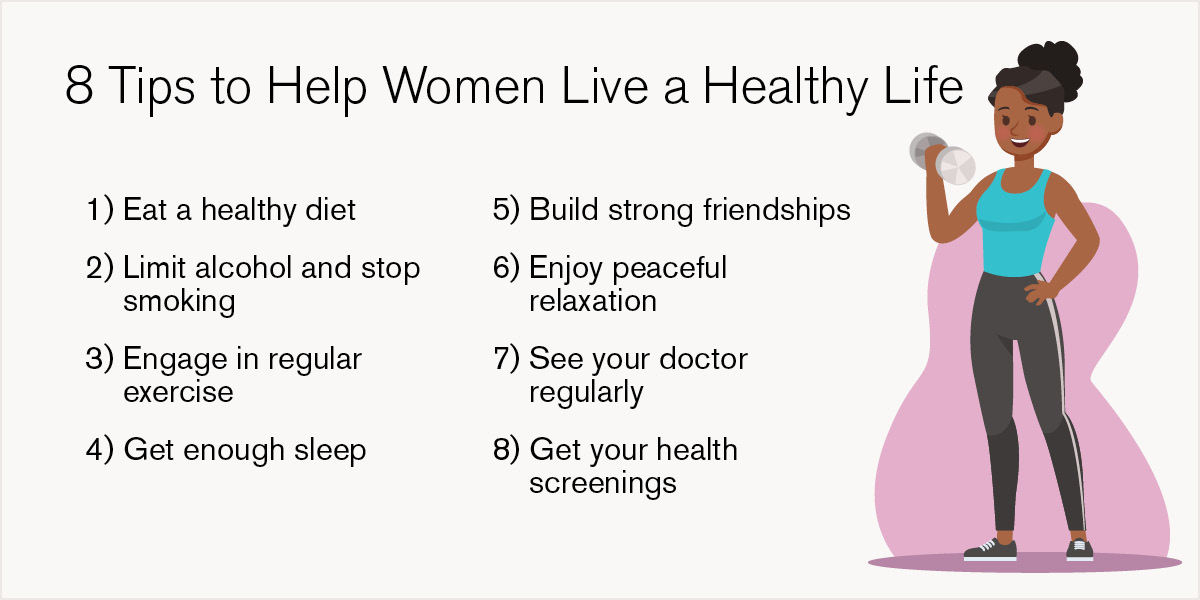 By Shilpa Desai, DO, Internal Medicine
By Shilpa Desai, DO, Internal Medicine
Women have different needs and face different health concerns as they grow older. No matter what stage of life, it is important to make good lifestyle choices. Eating a nutritious diet, exercising regularly, managing stress, avoiding tobacco, and limiting alcohol are important steps to a healthy future.
A key factor in achieving a healthier lifestyle is establishing care with a primary care provider that can help you focus on preventive health care.
Primary care providers identify screenings recommended for women of all ages while taking into account your specific health history.
The women's specialists at Loyola Medicine offer many lifestyle tips, recommendations and screenings to help you make each decade the healthiest it can be.

Women in their 20s
While you may not experience significant health challenges and transitions during your 20s, it is vital to establish healthy habits to help prevent illnesses and diseases that can come with age.
In addition to a nutritious diet, women should aim for seven to eight hours of sleep per night and have at least 30-60 minutes of daily exercise.
Finding a trusted primary health care provider is critical to your future health. Your doctor will inquire about your diet, exercising, smoking history and alcohol use in order to help guide you on living a healthy lifestyle. They can also help address health concerns earlier based on their knowledge of your specific family and personal medical history and risk factors.
A primary care doctor will also conduct an annual woman wellness exam that will cover:
- Age-appropriate vaccinations
- Blood pressure
- Cholesterol levels
- Diabetes
- STD testing
- Thyroid disorders
Women in their 30s
Like many women in their 30s, you may be juggling a career, a home life and other important responsibilities, so it's important to deal with stress in a healthy manner. Be sure to speak with your doctor about maintaining a healthy BMI and address any new health concerns, including mental health conditions, such as anxiety and depression.
You should continue to exercise regularly, eat healthy and keep practicing the other healthy habits you've established in your 20s. If you're thinking of becoming pregnant, speak with your doctor about health issues you might face, like gestational diabetes.
Additionally, women should discuss fertility issues and STD testing with their doctor. You should also be performing monthly self-breast exams and discussing any new moles or changes in skin with your provider.
While in their 30s, a woman's primary care doctor will screen for:
- Age-appropriate vaccinations
- Blood pressure
- Blood sugar
- Cholesterol levels
- PAP smear screening
Women in their 40s
Women in their 40s experience a time of transition in physical and mental health, mainly due to the hormonal changes that come with perimenopause. These changes in hormones can lead to high blood pressure, heart disease and even feelings of anxiety or depression.
You may also start to notice weight gain, changes in libido and even experience hot flashes. It is important to eat healthy and incorporate physical activity to help manage these symptoms.
You should also continue performing monthly self-breast exams and watching for moles on your skin. Women in their 40s should discuss changes with their primary care doctor as well as get the appropriate screenings, including:
- Age-appropriate vaccinations
- Blood sugar
- Blood pressure
- Changes in skin
- Cholesterol levels
- Mammogram
- PAP smears
Women in their 50s and beyond
More than ever, women at this age need to prioritize their health to help prevent illnesses as they reach their 50s and beyond. Menopause affects hormone levels and during this period of life it is common to see weight gain in the midsection.
To help keep physically healthy, incorporate low-impact exercises like yoga, aerobics and weight training in a workout routine to help control weight. Another benefit of weight training is that it can help increase muscle mass and bone density.
As women (and men) grow older, bone density decreases, making it important to meet with a primary care doctor to schedule a bone density test and help prevent osteoporosis.
Growing older also leads to changes in sleep patterns. Women in their 50s and beyond should get at least seven hours of sleep each night and note any signs of disturbed sleep with their doctor.
One way to keep your mind sharp and healthy is to engage in puzzles and other brain stimulating activities, as well as participate in social activities to help ward off depression and other mental health conditions.
By age 50, women should speak with their doctor about preventative health screenings, such as:
- Age-appropriate vaccinations
- Bone density
- Blood sugar
- Colonoscopy
- Mammogram
- Vision and hearing tests
No matter the age, it is vital to make your health a priority in order to live a long, healthy and happy life. Staying active, eating healthy, and challenging your mind and body through new activities are lifestyle habits you can begin at any stage in life.
At Loyola Medicine, we believe the most important thing for any woman to do is to meet with their primary care doctor annually to ask questions, bring up any health concerns and complete recommended preventative health screenings.
Shilpa Desai, DO, is an internal medicine physician at Loyola Medicine. Her clinical interests include a focus on women's health and preventive care.
Dr. Desai earned her medical degree at Ohio University. She completed an internship and residency at Summa Akron City Hospital and a fellowship at the University of Arizona College of Medicine - Tucson Program.
Book an appointment today to see Dr. Desai or another Loyola specialist by self-scheduling an in-person or virtual appointment using myLoyola.

